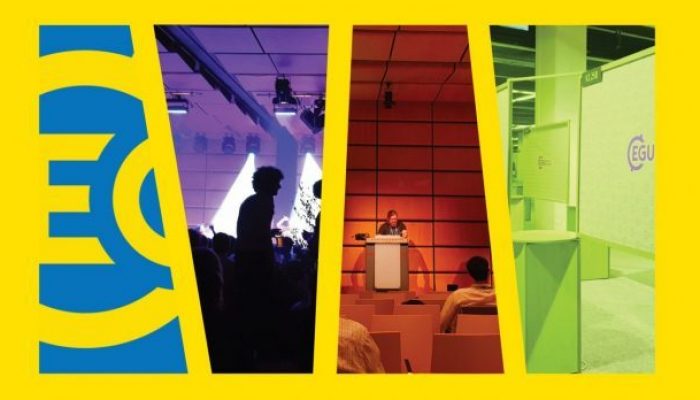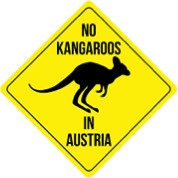
Having just about recovered from the session-packed, networking-fest, coffee-filled, schnitzel-test that was EGU2018 (8-13th April, Vienna), it is now possible to reflect and look towards upcoming dates. Earlier posts in the blog have described some of the GD side event highlights. For this week’s post, I have summarised some key points from the GD Division meeting, the EGU Mentoring program, and the upcoming EGU award nominations.
Geodynamics (GD) Division Meeting
During the Friday lunchtime break GD President Paul Tackley (ETH Zürich) led the session about GD activities and statistics to an eager audience of around 50 attendees. Within the 19 GD-led sessions for EGU2018 there were 481 abstracts (adding co-organized sessions raised this to ~1450 abstracts). As in previous years, the structure of EGU, and meeting fun facts were delivered – this year there were over 15.000 attendees, 17.000 abstracts in the programme, 666 unique sessions and 68 short courses. New to this year’s conference, there was a Cartoonist and Poet-in-residence, re-usable water bottles, and CO2 emission offset initiative.
A portion of the lunchtime meeting was dedicated to discussing the time and space constraints associated with increasing attendance and presentations at the GA. Many rooms are already overcrowded and maximum poster capacity is expected to be reached within the next 2 years (this year 8% of GA presentations were PICOs, 64% posters and 28% orals). As extra space in the Austria Centre Vienna is not a possibility, several ideas were put forward by EGU including increasing the GA from 5 to 6 days, limiting to 1 abstract per person (2 if invited), increasing oral times from 6-8 hours per day, holding different posters in morning and afternoon, and shorter talks (12 minutes). Several audience members expressed opinions regarding the proposed changes, and the audience seemed in favour of more overall oral time-slots but not shorter talks, or moving to a 6 day conference. We shall see what is implemented but there are at least new set of rules for 2019:

Apart from the consumption of free sandwiches, audience arms were put to use when voting for Division Officers (van Hunen, Artemieva, Biggin, Bunge, Karato) and the Medal Committee (Houseman, Parmentier, Parsons, Phipps Morgan) – all approved.
For the GD ECS specifics, we will welcome the new GD Early Career Scientist (ECS) Representative Nicholas Schliffke (U. Durham), as Adina Pusok (UC San Diego) steps into a co-representative position for the next year. Our blog activities over the last year were also presented by our enthusiastic Editor-In-Chief Iris van Zelst (ETH, Zürich). As always, we encourage more ECR members to get in touch with us to be a guest writer.
Some important EGU2019 dates for your calendar:
25 June-13 September 2018
Public call-for-sessions
(the rolling over of sessions will not occur – join forces with your colleagues!)
15 October 2018 – 10 Jan 2019
Abstract submission
7-12 April 2019
EGU2019, Vienna
EGU GD Awards
The Meeting also highlighted the Division’s 2018 award recipients, Edgar Marc Parmentier and Thibault Duretz, which we here congratulate again:

The GD Outstanding Poster/PICO (OSPP) for 2017 was awarded to Ludovic Räss for his poster “M2Di: MATLAB 2D Stokes solvers using the finite difference method.”
In particular, please note the upcoming deadline for award nominations for 2019 on the 15th June.
We encourage you to put forward your colleagues for nominations for both categories! You can read more about the awards and nomination process here.
And with only a single female winner of the GD Outstanding Early Career Scientist Award (<7 years from highest degree; no age limitation), and none for the Augustus Love Medal, I am sure you do not have to look far for worthy candidate(s) to help improve the gender balance of these awards.
Mentoring program – we need you!
In its second year running, EGU organized a mentoring program during the conference. This year the program received double the number of registrations from 2017. The aim is to connect mentors – those who are EGU veterans in terms of multiple attendances – with mentees, prioritized to early-career participants (Masters and PhDs) who are first-time attendees. Matching was primarily based on division affiliations or research keywords, but as there are 22 divisions and over 50 identified research interests, interdisciplinary matches were commonplace.

This year from GD specifically there were 3 mentors and 2 mentees signing up – as EGU Media and Communications Officer Barbara Ferreira said “a rare (and positive) case of more mentors than mentees registering for the programme”. These 3 mentors were eventually matched with 6 mentees. However, across the board around 75 mentees had to be rejected because of insufficient mentors available.
So, if you have attended numerous EGU GAs and know the lay of the land, please do sign up next year! I can highly recommend being a mentor; to sit down for a coffee and a chat is really not taxing and is a good opportunity to meet new faces in your division and from further afield.
Tschüss – see you in Vienna next year.
 Editorial thanks to GD President Paul Tackley and EGU Media and Communications Officer Bárbara Ferreira (@dinnerpartysci) for summary slides for the GD Meeting and Mentoring programs, respectively. Cheers again to the EGU organizers for a fantastic meeting.
Editorial thanks to GD President Paul Tackley and EGU Media and Communications Officer Bárbara Ferreira (@dinnerpartysci) for summary slides for the GD Meeting and Mentoring programs, respectively. Cheers again to the EGU organizers for a fantastic meeting.




